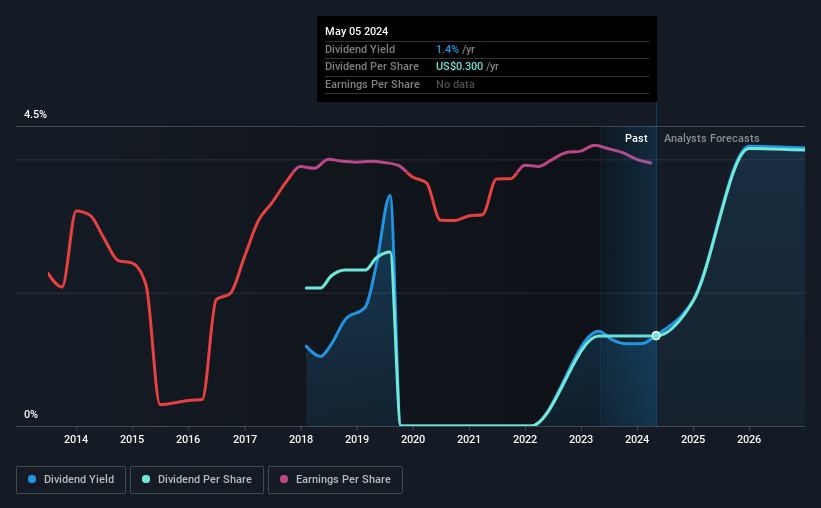Peabody Energy (NYSE:BTU) Is Paying Out A Dividend Of $0.075
The board of Peabody Energy Corporation (NYSE:BTU) has announced that it will pay a dividend of $0.075 per share on the 5th of June. This means the annual payment will be 1.4% of the current stock price, which is lower than the industry average.
View our latest analysis for Peabody Energy
Peabody Energy's Payment Has Solid Earnings Coverage
If it is predictable over a long period, even low dividend yields can be attractive. Before making this announcement, Peabody Energy was easily earning enough to cover the dividend. This means that most of its earnings are being retained to grow the business.
Over the next year, EPS is forecast to fall by 29.7%. Assuming the dividend continues along recent trends, we believe the payout ratio could be 7.3%, which we are pretty comfortable with and we think is feasible on an earnings basis.
Peabody Energy's Dividend Has Lacked Consistency
Peabody Energy has been paying dividends for a while, but the track record isn't stellar. If the company cuts once, it definitely isn't argument against the possibility of it cutting in the future. Since 2018, the dividend has gone from $0.46 total annually to $0.30. This works out to be a decline of approximately 6.9% per year over that time. A company that decreases its dividend over time generally isn't what we are looking for.
Peabody Energy May Find It Hard To Grow The Dividend
With a relatively unstable dividend, and a poor history of shrinking dividends, it's even more important to see if EPS is growing. Peabody Energy has seen earnings per share falling at 2.3% per year over the last five years. Declining earnings will inevitably lead to the company paying a lower dividend in line with lower profits.
Our Thoughts On Peabody Energy's Dividend
In summary, while it's good to see that the dividend hasn't been cut, we are a bit cautious about Peabody Energy's payments, as there could be some issues with sustaining them into the future. The company is generating plenty of cash, which could maintain the dividend for a while, but the track record hasn't been great. We don't think Peabody Energy is a great stock to add to your portfolio if income is your focus.
Companies possessing a stable dividend policy will likely enjoy greater investor interest than those suffering from a more inconsistent approach. Still, investors need to consider a host of other factors, apart from dividend payments, when analysing a company. For example, we've identified 3 warning signs for Peabody Energy (1 is a bit unpleasant!) that you should be aware of before investing. If you are a dividend investor, you might also want to look at our curated list of high yield dividend stocks.
Have feedback on this article? Concerned about the content? Get in touch with us directly. Alternatively, email editorial-team (at) simplywallst.com.
This article by Simply Wall St is general in nature. We provide commentary based on historical data and analyst forecasts only using an unbiased methodology and our articles are not intended to be financial advice. It does not constitute a recommendation to buy or sell any stock, and does not take account of your objectives, or your financial situation. We aim to bring you long-term focused analysis driven by fundamental data. Note that our analysis may not factor in the latest price-sensitive company announcements or qualitative material. Simply Wall St has no position in any stocks mentioned.

 Yahoo Finance
Yahoo Finance 
